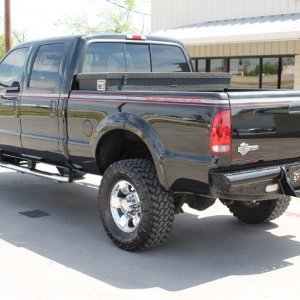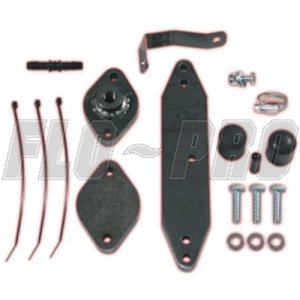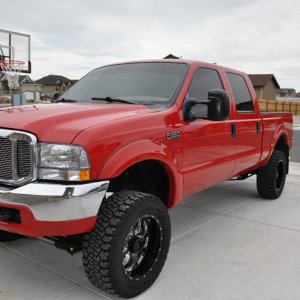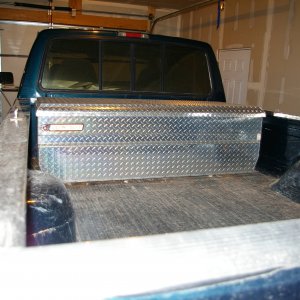You are using an out of date browser. It may not display this or other websites correctly.
You should upgrade or use an alternative browser.
You should upgrade or use an alternative browser.
Oil Aeration
- Thread starter bama29fan
- Start date
02BigD
New member
Any other symptoms? Engine smooth, and power levels normal?
the hpop is getting weak. icp drops to about 2500psi and ipr% up to 75% on WOT run.
there is a noise that has been bothering me for a while...sounds like an exhaust leak sometimes and at others it sounds like injector noise. kind of a ticking...Tkachu Tkachu sound that goes away when i let off the throttle.
power seems fine and mileage is still good. i have notice using a little more oil lately also. currently have about 6K miles on T6 5/40 Synthetic.
there is a noise that has been bothering me for a while...sounds like an exhaust leak sometimes and at others it sounds like injector noise. kind of a ticking...Tkachu Tkachu sound that goes away when i let off the throttle.
power seems fine and mileage is still good. i have notice using a little more oil lately also. currently have about 6K miles on T6 5/40 Synthetic.
SPEEDDEMON31176
New member
:whs: Probably too thin of an oil for a high mileage lpop and it is causing cavitation.
Change oil types??? Why??
You have 6K miles!! on a cheap quasi syn that is know to shear faster at higher mileage then other higher end real syns!!!!
Before you go changing things up, first try changing your oil a maximum of ever 5K. If you tend to be a spirited driver many on here would be changing their oil even sooner.
Unless you are doing UOA you really have no business going past 5K on any oil.
Yes things like oil consumption and foaming, shearing will all go up faster at a certain point as you are using up the additive packages in the oil and wearing down the base oils properties as well. The lower quality the oil the faster this will happen.
Once the oil warms up there is very little difference in viscosity of a 15w40 and 5w40. After all if there was what would be the point of the range system they give for oil vis? Different oil vis for different environmental temps has to do with the cold range vis not the hot temp vis. Now there certianly can be differences in oil additives such as ones that prevent foaming as well as the quailty of the base oils going from one oil manf or line of oils and another.
With a HUEI motor it will clearly tell you when you have gone to long with OCI if you are observant of how your engine runs. By 6K with Rot its would be trying hard to get your attention.
Just think about what happens to the oil in a HUEI the harder you drive one. Think about what it goes thru compared to other diesels that are non HUEI. Not to mention how much you are decreasing the life of your injectors by running oil for longer OCI.
You have 6K miles!! on a cheap quasi syn that is know to shear faster at higher mileage then other higher end real syns!!!!
Before you go changing things up, first try changing your oil a maximum of ever 5K. If you tend to be a spirited driver many on here would be changing their oil even sooner.
Unless you are doing UOA you really have no business going past 5K on any oil.
Yes things like oil consumption and foaming, shearing will all go up faster at a certain point as you are using up the additive packages in the oil and wearing down the base oils properties as well. The lower quality the oil the faster this will happen.
Once the oil warms up there is very little difference in viscosity of a 15w40 and 5w40. After all if there was what would be the point of the range system they give for oil vis? Different oil vis for different environmental temps has to do with the cold range vis not the hot temp vis. Now there certianly can be differences in oil additives such as ones that prevent foaming as well as the quailty of the base oils going from one oil manf or line of oils and another.
With a HUEI motor it will clearly tell you when you have gone to long with OCI if you are observant of how your engine runs. By 6K with Rot its would be trying hard to get your attention.
Just think about what happens to the oil in a HUEI the harder you drive one. Think about what it goes thru compared to other diesels that are non HUEI. Not to mention how much you are decreasing the life of your injectors by running oil for longer OCI.
97powerstroke
New member
:whs:
Here is a bit more through explanation of the previous post I made. I think it may be helpful in assisting people in how to pick or rate various oils and what specs are important.
Once the oil warms up there is very little difference in the SAE viscosity of a 15w40 and 5w40 IF the HTHS numbers are the same or close. This is the spec rating, HTHS, people should actually be looking at for protectiveness and what we think of as thickness of the oil. If you are going solely by the standard -w-- (5w40) SAE rating then technically once at operating temp there is no difference between a 5w40 15w40 or anything *w40 for that matter as they all have the same SAE hot temp viscosity rating. So much has been convoluted for the purposes of marketing and making profits you have to dig deeper. Different oil vis for different environmental temps has to do with the cold range vis not the hot temp vis. Now there certianly can be differences in oil additives such as ones that prevent foaming as well as the quailty of the base oils going from one oil manf or line of oils and another. This is why you need to get the actual spec ratings of the oil you are using, including specifically the HTHS level. There is a dif between the min spec to get various API ratings and what is the recommended specs of various components such as those put forth by the the actual diesel manufactures or the DEM association.
HTHS stands for, High Temp High Shear. It is a test method to measure oil vis under "High Temp High Shear" conditions that would be useful in a engine such as valve train or bearing areas or in our case add to that the HPOP and its Injectors. But there is a big push for fuel efficiency ratings and the lower the HTHS in general the better the mpg but the lower longevity of and rate of wear protections. A reason diesel oils in general are the highest rated oils compared to those specific to gasoline only. As long as a oil gets you past a vehicle manf warranty period what do they really care about more longevity compared to meeting a better mpg rating with all the international pressure on conventional fuel use. MPG is gonna win every time in major lines.
Good synthetics tend to hold their HTHS and TBN levels better than dinos so a slightly lower number might be equal (you see this with budget quasi syn) but personally I want to see the higher HTHS numbers.
Rotella since it switched to its T6 formula has changed its policy and refuses to give out its HTHS rating. This makes it suspect IMO. There is also talk of different formulas being made in Canada versus USA for the same labeled oil. Rotella's Dino 15w40 if unchanged had a rating of 3.9 HTHS according to Rot literature. My guess is T6 is similar but may not be.
IMO, for good quailty diesel you should be looking for numbers not below 4.0
If I had to pick a pure Dino oil that you can get easily off the shelf at stores: Mobile Delvac with a HTHS of 4.3 would be it. It also scores very high in other categories.
In general oils have moved to lower HTHS numbers to rate better in fuel efficiency. So new formulas tend to have lower ratings as their is a direct correlations between the two. So lower protection better mpg versus better protection and holding in grade during hard use. In fact numerous protective contents and specs have all been lowered in the name of trivial mpg gains and now to protect the extremely expensive emissions equipment being added to our diesels which already had less over all pollutants compared to gasoline in output per mile.
With a HUEI motor it will clearly tell you when you have gone to long with OCI if you are observant of how your engine runs. By 6K with Rot its would be trying hard to get your attention.
Just think about what happens to the oil in a HUEI the harder you drive one. Think about what it goes thru compared to other diesels that are non HUEI. Not to mention how much you are decreasing the life of your injectors by running oil for longer OCI.
I personally run Schaeffer's 9000 5w40 with a HTHS:4.5 TBN:10.6 100c temp Viscosity:15.75 NOACK:11
Once the oil warms up there is very little difference in the SAE viscosity of a 15w40 and 5w40 IF the HTHS numbers are the same or close. This is the spec rating, HTHS, people should actually be looking at for protectiveness and what we think of as thickness of the oil. If you are going solely by the standard -w-- (5w40) SAE rating then technically once at operating temp there is no difference between a 5w40 15w40 or anything *w40 for that matter as they all have the same SAE hot temp viscosity rating. So much has been convoluted for the purposes of marketing and making profits you have to dig deeper. Different oil vis for different environmental temps has to do with the cold range vis not the hot temp vis. Now there certianly can be differences in oil additives such as ones that prevent foaming as well as the quailty of the base oils going from one oil manf or line of oils and another. This is why you need to get the actual spec ratings of the oil you are using, including specifically the HTHS level. There is a dif between the min spec to get various API ratings and what is the recommended specs of various components such as those put forth by the the actual diesel manufactures or the DEM association.
HTHS stands for, High Temp High Shear. It is a test method to measure oil vis under "High Temp High Shear" conditions that would be useful in a engine such as valve train or bearing areas or in our case add to that the HPOP and its Injectors. But there is a big push for fuel efficiency ratings and the lower the HTHS in general the better the mpg but the lower longevity of and rate of wear protections. A reason diesel oils in general are the highest rated oils compared to those specific to gasoline only. As long as a oil gets you past a vehicle manf warranty period what do they really care about more longevity compared to meeting a better mpg rating with all the international pressure on conventional fuel use. MPG is gonna win every time in major lines.
Good synthetics tend to hold their HTHS and TBN levels better than dinos so a slightly lower number might be equal (you see this with budget quasi syn) but personally I want to see the higher HTHS numbers.
Rotella since it switched to its T6 formula has changed its policy and refuses to give out its HTHS rating. This makes it suspect IMO. There is also talk of different formulas being made in Canada versus USA for the same labeled oil. Rotella's Dino 15w40 if unchanged had a rating of 3.9 HTHS according to Rot literature. My guess is T6 is similar but may not be.
IMO, for good quailty diesel you should be looking for numbers not below 4.0
If I had to pick a pure Dino oil that you can get easily off the shelf at stores: Mobile Delvac with a HTHS of 4.3 would be it. It also scores very high in other categories.
In general oils have moved to lower HTHS numbers to rate better in fuel efficiency. So new formulas tend to have lower ratings as their is a direct correlations between the two. So lower protection better mpg versus better protection and holding in grade during hard use. In fact numerous protective contents and specs have all been lowered in the name of trivial mpg gains and now to protect the extremely expensive emissions equipment being added to our diesels which already had less over all pollutants compared to gasoline in output per mile.
With a HUEI motor it will clearly tell you when you have gone to long with OCI if you are observant of how your engine runs. By 6K with Rot its would be trying hard to get your attention.
Just think about what happens to the oil in a HUEI the harder you drive one. Think about what it goes thru compared to other diesels that are non HUEI. Not to mention how much you are decreasing the life of your injectors by running oil for longer OCI.
I personally run Schaeffer's 9000 5w40 with a HTHS:4.5 TBN:10.6 100c temp Viscosity:15.75 NOACK:11
thanks for all the info....
I have done a UOA...about 3k miles ago and the TBN was 9.7
I am planning on changing the oil today after work and fingers crossed all will be right again.
Before going to the T6 i was running regular Rotella 15/40 and changing at about 4K miles. You are right...i could tell the difference in sound as the oil got closer to 4K.
I have done a UOA...about 3k miles ago and the TBN was 9.7
I am planning on changing the oil today after work and fingers crossed all will be right again.
Before going to the T6 i was running regular Rotella 15/40 and changing at about 4K miles. You are right...i could tell the difference in sound as the oil got closer to 4K.
Yes sir. In a way that is something I like about the HEUI. It talks to you and tells you there is issues before things can get really damaged. Take oil if there is an issue our engines will just stop running.
TBN is a good number that can be helpful but its telling you about the additives not really the vis which is what you really care about most, specifically the HTHS vis. While we can have so little soot for lack of a EGR which will tend to allow our TBN numbers to stay high the shearing effect of our HPOP and injectors will have HTHS low. Sort of the opposite of what other non-HEUI would see.
TBN is a good number that can be helpful but its telling you about the additives not really the vis which is what you really care about most, specifically the HTHS vis. While we can have so little soot for lack of a EGR which will tend to allow our TBN numbers to stay high the shearing effect of our HPOP and injectors will have HTHS low. Sort of the opposite of what other non-HEUI would see.












